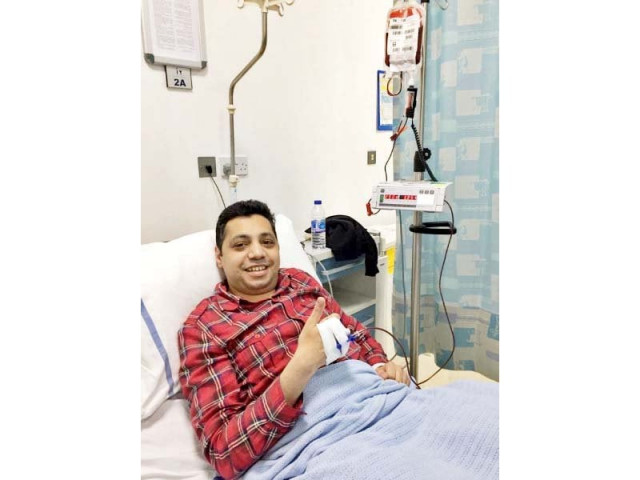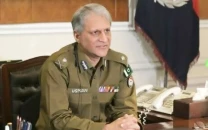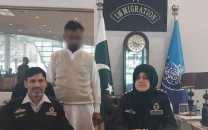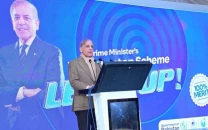Negligence almost cost this patient’s life
Through careful health management, thalassemia-major patient defied life expectations

Sohaib Azam. PHOTO: EXPRESS
But over the next 33 years, they learned that transfusions were the least of their worries, rather, negligence almost cost him his life.
For 35-year-old Azam, his family was initially clueless about his condition and only considered his pale colouring, yellow eyes and lethargy to be him. But on a visit to his doctor aunt in London, they were advised to get him checked. “I got my hb level tested and it came back pretty low which prompted the doctors to screen me for thalassemia and I was diagnosed with beta-thalassemia major,” Azam now recalls.
World Thalassemia Day: PAF opens its bases for ailing children
The news left his parents flattened.
“This is going to be a lifelong dependency on regular blood transfusions and a huge responsibility to raise me. They were broken,”.Azam said
With his family hailing from Multan, a city which had still to develop in the 1980’s, his parents were scared of losing their son early — at least going by the what they were told by friends and relatives in their hometown.
But with his father finding work in Saudi Arabia, Azam was able to get the help he needed.
Khyber-Pakhtunkhwa's fight against thalassemia
He received his first transfusion at the age of two at a government-run hospital in Dammam.
“I used to go to a children’s hospital where I had to get admitted every time and then stay there for two to three nights,” Azam said describing the antiquated blood transfusion method employed.
He recalled glimpses of his mother lying by his side by laying her abaya on the ground due to the lack of an escort’s bed.
“The process used to be painful as I was very young and I had to get daily injections on my belly for chelation was not bearable,” he said.
After the transfusion, the doctors gave him medication for detoxifying his blood (chelation).
But what no one checked was the health of the remaining organs.
The start of the first Gulf war forced his family to return to Pakistan. Despite living in a settled metropolis like Lahore, Azam said his family found it hard to find blood for transfusion. Even rarer was the availability of transfusion machines at hospitals.
To make matters worse, chelation medicines were in short supply.
Azam said that they used the stock they had brought back from Saudi Arabia, but they quickly ran out.
“I did not take Desferal injections for a few months and because of that my iron ferritin levels shot up so high that they actually started disturbing my other organs and damaging it,” Azam recalled. Moreover, he contracted Hepatitis-C.
In 1996, his father moved to Dubai where Azam received treatment at the Thalassemia Centre. His health started to improve and he managed to shake off hepatitis as well.
Having suffered from thalassemia, medically and socially, Azam decided to help others who had a similar affliction.
“I had been serving the thalassemia community since I was 14-years-old,” Azam said. He worked with his thalassemia-major friend Jatin to set up Thalassemians, a welfare organisation for thalassemia patients in Karachi.
“Living with thalassemia is not easy and there are a lot of challenges associated with it like our social lives, academics, career, married life but it is not impossible,” says Azam who is married and has two thalassemia-minor children.
“If health is managed properly, then all thalassemia-majors can lead a normal life, provided the compliance to chelation is regular with timely transfusions,” he added.
He added that the government has a responsibility to provide patients with the support they need and to operate prevention programmes and campaigns.
“It is rare to see such stories and people living up to that age with this disease,” says Ayesha Abid, the president of the Thalassemia Awareness and Prevention in Pakistan (TAPP) organisation.
“Thalassemia patients die at a very young age due to lack of proper treatment and care,” she lamented.
“Prevention or treatment? the choice is yours. Pre-marital blood screening of Thalassemia and discouragement of marriage between two Thalassemia minors can avoid Thalassemia-Major births in Pakistan,” she stressed.
Published in The Express Tribune, May 8th, 2018.



















COMMENTS
Comments are moderated and generally will be posted if they are on-topic and not abusive.
For more information, please see our Comments FAQ